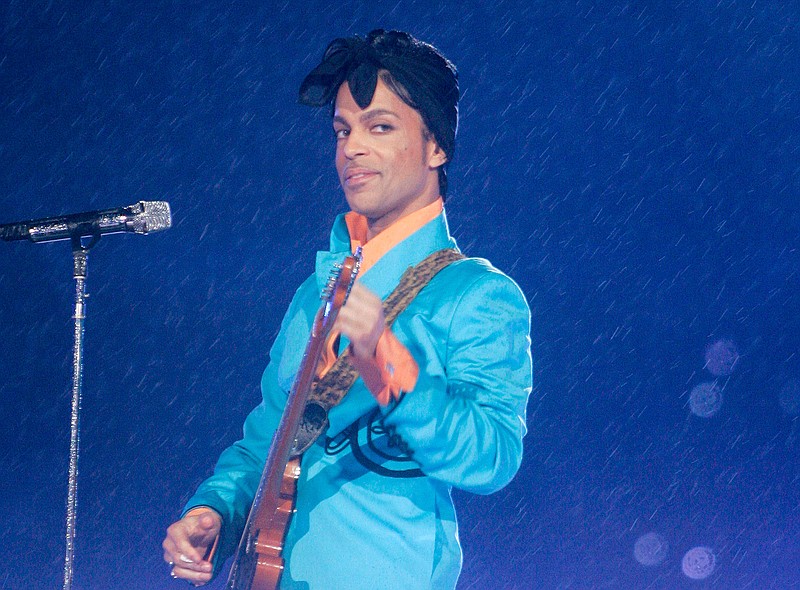MINNEAPOLIS-After
Prince had to be revived
from a drug overdose a week
before his death, one friend
told the musical superstar
that he needed to stop taking
painkillers. But Prince said he
couldn't-his hands hurt so
much that if he quit, he'd have
to stop performing.
"This piano tour I think was
getting to his hands," singer
Judith Hill told investigators,
according to a transcript of
her interview.
Those words, found amid
hundreds of pages of interviews
between investigators
and Prince's closest confidants,
provide insight into just
how much the man known for
his energetic performances
and larger-than-life personality
was suffering. The documents
open parts of Prince's
life that the intensely-private
celebrity tried to keep from
even his closest confidants.
"How did he hide this so
well?" Prince's closest friend
and bodyguard Kirk Johnson
said in an interview with
detectives. While Johnson
said he didn't realize that
opioids were a problem until
that overdose, he had noticed
Prince was unwell before that
and took him to a doctor.
In their zeal to protect
Prince's privacy, Carver
County Attorney Mark Metz
said some of the singer's
friends might have enabled
him.
Prince was 57 when he was
found alone and unresponsive
in an elevator at his Paisley
Park studio compound in suburban
Minneapolis on April
21, 2016. An autopsy found
he died of an accidental overdose
of fentanyl, a synthetic
opioid 50 times more powerful
than heroin. Authorities
say it is likely Prince didn't
know he was taking the dangerous
drug, which was laced
in counterfeit pills made to
look like a generic version of
the painkiller Vicodin.
The source of those pills
is unknown and no one has
been charged in Prince's
death.
Authorities say Dr. Michael
Todd Schulenberg admitted
that he prescribed another
drug, oxycodone, under
Johnson's name to protect
Prince's privacy. Schulenberg
disputes that, but paid $30,000
to settle allegations the drug
was prescribed illegally.
Privacy is a theme in interviews
with investigators.
Joshua Welton, who co-produced
some of Prince's
work, and Hannah Welton,
the drummer in the Princecreated
band 3rdEyeGirl, said
they were like Prince's family.
Joshua Welton described
Prince's inner circle at the
time of his death as "very,
very, very, very, very tight"-
including Johnson, assistant
Meron Bekure and the
Weltons. He said he had
seen little of Prince's sister,
Tyka Nelson, in recent years.
"He's made comments like
you guys are more family to
me than my blood relatives,"
Welton said.
Johnson and Hill were on
Prince's plane when he overdosed
on the way back from
an April 14, 2016, concert in
Atlanta. Hill said that Prince
told her he was depressed,
enjoyed sleeping more than
usual and was incredibly
bored. He told her after his
show that he thought he was
going to fall asleep on stage.
The plane made an emergency
landing in Moline,
Illinois, and after Johnson
carried Prince from the plane
"like you would carry a little
kid or a baby," paramedics had
to use two doses of a medicine
that reverses the effects
of an opioid overdose. When
Prince took a large gasp of
air and woke up, he looked at
Johnson without saying anything
and Johnson told paramedics,
"Prince feels fine,"
according to documents.
At the hospital, Prince
refused medical tests. He told
Hill that he had just mixed
two pills-that he was a good
judge of his body and wouldn't
do it again. But when she told
him "no more pills right?" he
wouldn't agree.
"He said something like
well then that means I can't
perform because my hands
are hurting. My hands hurt,"
according to a transcript of
her interview with investigators.
Investigative materials
released Thursday include
several other interviews, documents,
photos and videos.
There are pictures of pills that
were found in various bottles
in several different rooms.
Authorities have said many
of those pills were not in their
proper containers, and many
were counterfeit.
The documents include
interviews with Schulenberg
and Prince's inner circle,
including Johnson, who told
investigators he had noticed
Prince "looking just a little
frail," but said he did not realize
he had an opioid addiction
until the overdose on the
plane. After that, Johnson said
he and others reached out to
an addiction specialist.
But Johnson had initially
contacted Schulenberg, his
own doctor, to treat Prince in
the fall of 2015. Schulenberg
told investigators that
Johnson texted him on April 7,
2016, saying Prince was complaining
of numbness and tingling
in one of his legs and in
his hands and had vomited
the night before. Schulenberg
prescribed some medications
under Johnson's name and
gave Prince an IV, according
to documents.
Schulenberg asked Prince if
he was taking anything for his
hands and Prince said yes, but
"did not know what it was,"
documents show.
Johnson also called
Schulenberg on the day of
the Atlanta concert before the
flight on which Prince overdosed
and asked the doctor
to give Prince a painkiller.
Authorities say Schulenberg
did so, under Johnson's
name. Johnson contacted
Schulenberg again on April
18 and expressed concern that
Prince was struggling with
opioids.
Schulenberg last treated
Prince the night before he
died, conducting a urinalysis
that tested positive for opioids.
Meanwhile, Johnson and
others had reached out to
addiction specialist Howard
Kornfeld, who dispatched his
son to Paisley Park to try to
convince Prince to seek treatment.
Andrew Kornfeld showed
up the following morning. He
was among those who found
Prince dead.
Associated Press writers
Steve Karnowski and Doug
Glass in Minneapolis, Ryan J.
Foley in Iowa City, Iowa, and
Tammy Webber in Chicago
contributed this report.

